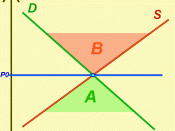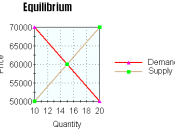Matthew McDowell
Assuming there is pure competition in the market place, and no government intervention, we are able to focus on how the price mechanism determines the equilibrium price in the market. Markets can be effective at resolving the basic issues of what and how much to produce at a certain price level although left to operate on its own, the market can still create unsatisfactory outcomes. When markets do not produce the desired outcome, it is known as market failure and when this occurs, governments may intervene in the market.
How the price mechanism brings about the equilibrium price in the market can be determined assuming we have pure competition in the market place and no government intervention. Simply put, the concept of pure competition mean that no participant in the market has the power to influence market outcomes directly, such as by setting prices. The price mechanism is the interplay of the forces of supply and demand in determining the market prices at which goods and services are sold and the quantity of which is produced.
The quantities of goods and services demanded and supplied is regulated by the prices of those goods and services. If the price of a commodity for sale is too high according to consumer demand, the quantity supplied will exceed the quantity demanded. If the price of a commodity is too low according to consumer demand, the quantity that is demanded will exceed the quantity supplied. There is one price, and only one price, at which the quantity demanded, is equal to the quantity supplied. This is known as the equilibrium price.
Figure 1.0 - Excess Demand
Figure 1.0 shows that at price 0P1, the quantity demanded (0Q2) exceeds the quantity supplied (0Q1). The price is below equilibrium in this case and the...


